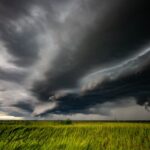“It feels like there have been staggering science stories emerging every other day recently, all of which have blown our tiny little minds,” says an article in
a science magazine earlier this month.
The article went on to note “the discovery of a terrifying black hole…the huge hole found in the sun…and a missing continent found after going missing for 375 years.”
However, another recent find is what seems to be baffling the scientific community. For some time now, it has been looking at a huge supply of water 400 miles near the Earth’s crust stored in a rock known as “ringwoodite.” But this is no ordinary discovery scientists have been studying. “If the rock contained just 1 percent water, it would mean that there is three times more water under the surface of the Earth than there is in the oceans on the surface.” About 71 percent of the Earth’s surface is covered with water with only 2.5 % fresh water. The oceans hold about 96.5 percent of the planet’s water.
“Ocean water is constantly evaporating, increasing the temperature and humidity of the surrounding air to form rain and storms that are then carried by trade winds. In fact, almost all rain that falls on land starts off in the ocean. The tropics are particularly rainy because heat absorption, and thus ocean evaporation, is highest in this area.”
What all this water talk brings to mind is Noah’s Story in the Bible. The story of the great flood. The story of the great deluge on Earth millennia ago is not unique to the Bible as many cultures have a flood story, be it myth or legend, in local folklore, or in their sacred writings. Nevertheless, scientists have yet to conclude the biblical account of the Great Flood of Noah’s time did in fact occur.
The National Center for Science Education, in an article entitled, Yes, Noah’s Flood May Have Happened But Not Over the Whole Earth, observed that, “In the Epic of Gilgamesh, [Utnapishtim] is warned that a god plans to destroy all humanity and is told to build a ship to save himself, his family, friends, and cattle. In the Epic of Atrahasis, a tribal chief survived with his family by floating in a boat down to the Persian Gulf. After the flood subsided, the chief got out on dry land and erected an altar and sacrificed to a water god so that such a flood would not happen again (Anonymous nd-a). Noah also built an altar when he got off the Ark and offered sacrifices (Genesis 8:20). Because these stories all describe an ancient huge flood in Mesopotamia, it is extremely likely that a huge flood could have occurred.
In Genesis 7:11-12, speaking of the Great Flood of Noah’s days, we read, “In the six hundredth year of Noah’s life, in the second month, the seventeenth day of the month, the same day were all the fountains of the great deep broken up, and the windows of heaven were opened. 12 And the rain was upon the earth forty days and forty nights,” (emphasis mine).
Verse 23, “And every living substance was destroyed which was upon the face of the ground, both man, and cattle, and the creeping things, and the fowl of the heaven; and they were destroyed from the earth: and Noah only remained alive, and they that were with him in the ark.”
Science has advanced many arguments why a worldwide deluge at any time in history would have been impossible, namely as they affect “salt deposits formed by evaporation of seawater only occur in four of the five continents on Earth; fossilized raindrops are found cannot exist if the sediments were transported and deposited under water during a one-year Flood, and tiny sedimentary clay particles in shale in all the sedimentary rocks around the world had to be carried in very turbulent water by Noah’s Flood waters. Clay particles that are interlayered with volcanic ash layers in some places could not possibly settle out of turbulent water without the clay and ash being thoroughly mixed.”
Despite this stance, the Bible tells us in no uncertain terms that the flood was worldwide as “every living substance” which was upon the face of the Earth was destroyed.” If some scientists believe the flood could not have been global, but at least it could have happened, one big possibility is left out of the picture. The God of the Bible, YAHWEH says he’s a God of the impossible, as “nothing is impossible for God.”
Furthermore, human beings only think in human terms, whether it’s scientific or not. We can only think and reason physically; what is divine is beyond the realm of understanding. God does godly things that are beyond our comprehension because they are way above our capacity and ability to understand because of our finiteness. The Sovereign God can do anything He pleases, and when He does, it defies any human understanding because it’s coming from the hand of the Divine and Creator of everything in the universe that was ever made. The followers of Jesus Christ accept all of this by faith, but to the scientist, he or she wants to see the proof before acceptance. That’s what separates science from the things of God. We don’t have to see to believe although the evidence of His creation is all around us (Romans 1).
When the Bible says the fountains of the great deep were broken up or the bowels of the Earth opened, as some translations put it, based on our faith, Christians see the hand of God working here, something that is alien to the carnal mind. When we hear of a find that hints that there could be more water near the crust of the earth than what is in the planet’s oceans, it does not surprise us. In fact, it adds credence to our belief that the Holy Bible has always been right and correct in many of the speculations that baffle humanity, especially the scientific community.







Share This Article
Choose Your Platform: Facebook Twitter Linkedin